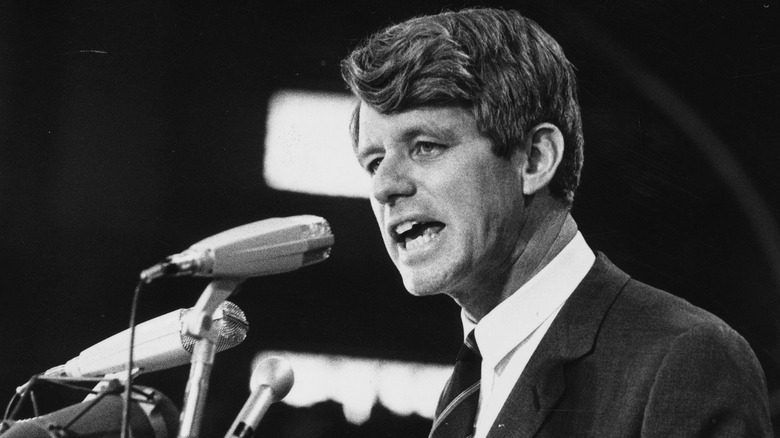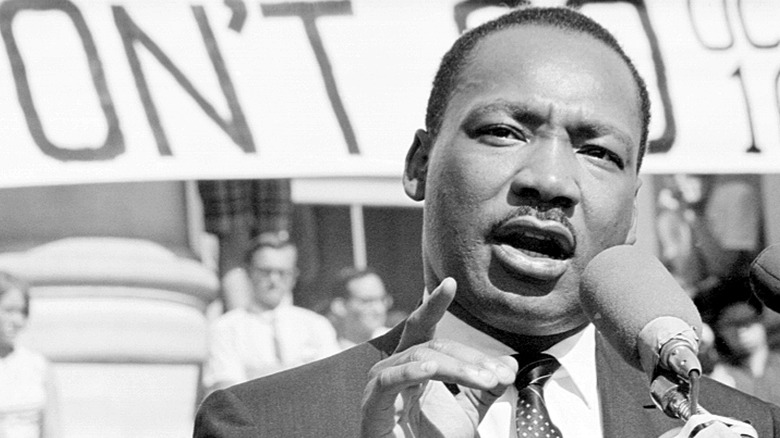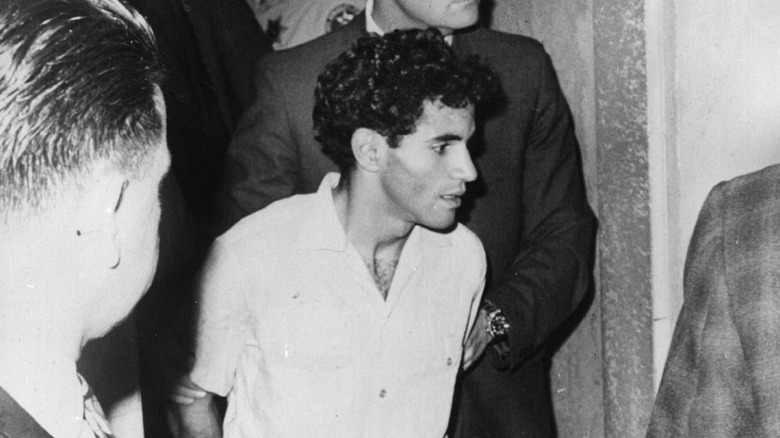The Tragic Story Behind Robert Kennedy's Death
To some in 1968, Robert F. Kennedy (RFK) seemed the country's last chance at a promising future. In the civil rights era, the former U.S. attorney general and candidate for the presidency built his platform around race reform and social justice issues. By doing so, RFK, who was the brother of the late President John F. Kennedy (JFK), sought to unite the economically underprivileged white working class and Black Americans. RFK was killed by an assassin before those goals could play out, though, and for this reason, Kennedy — much like his brother after he was struck down by an assassin's bullet five years earlier — remains a symbol of what might have been.
On the night that he died, RFK had won the all-important California primary when, after giving a victory speech at the Ambassador Hotel in Los Angeles, the politician made his way to exit the building through the pantry area. Around that same time, then-busboy Juan Romero shook Kennedy's hand to congratulate him on the victory when the White House hopeful was shot at close range. Pulling the trigger was 22-year-old Sirhan Sirhan, a Palestinian-born Jordanian citizen angered by Kennedy's perceived support of Israel. RFK died the next day, and in the chaos, five others were wounded before the shooter was tackled and disarmed.
Speaking with the Los Angeles Times in 2015, Romero said RFK's death "made me realize that no matter how much hope you have, it can be taken away in a second." RFK, Romero said, "made me feel like a regular citizen. He made me feel like a human being."
RFK died at a bad time for the country
Bookended by the mystic Summer of Love in 1967 and the Woodstock concert of 1969, the '68 presidential election in which RFK briefly ran for president as a Democrat took place during an especially catastrophic year for the United States. The ongoing Vietnam War saw its highest casualty toll with the so-called Tet Offensive, a major blow to Western ego and foreign policy. Simultaneously, the threat of communism — in Asia and elsewhere — crept ever onward. After the Prague Spring, then-Czechoslovakia returned to the communist Soviet Union's oppressive rule, and that April, civil rights leader Martin Luther King Jr. was assassinated.
After MLK Jr.'s death, then civil-rights leader and future Georgia representative John Lewis said with King gone (via History): "I felt I had lost a friend, a big brother, a colleague." Lewis continued: "I said to myself, 'Well, we still have Bobby Kennedy." As a candidate. RFK sent an anti-war message that stood in contrast to the policies of then-president Lyndon Baines Johnson (LBJ). RFK, who had famously feuded with LBJ, put himself forward for the Democratic nomination after Eugene McCarthy almost beat the incumbent president, who was JFK's former vice president and only took over the Oval Office after JFK's assassination.
A short time after Kennedy's candidacy was announced, LBJ said he would no longer seek his party's nomination. But as noted by Politico — and contrary to revisionist history underlining Kennedy's charisma — the candidate likely had no shot at winning. Notably, only 15 states used the primary, and Hubert Humphrey was significantly leading when RFK was assassinated.
Richard Nixon won The White House
On June 5, 1968, John Lewis' optimistic appraisal of Robert F. Kennedy still seemed reasonable, though Lewis didn't realize what was coming. To kill Kennedy, Sirhan Sirhan concealed a .22 revolver rolled up in a campaign poster as he approached Kennedy. When RFK died, grief weighed heavily on the conscience of then-busboy Juan Romero, who cradled the senator's head and stuffed rosary beads into his hand as he lay dying. As he told the Los Angeles Times, he couldn't help but wonder if Kennedy would still be alive had he not stopped to shake his hand.
Like the country, Romero experienced intense personal repercussions from this great American tragedy. For decades, Romero didn't even celebrate his own birthday, as it was also in June. Kennedy's tragic death was also a major hit to the American psyche, pulling it from the edge of a brighter future back into chaos. Though Romero's life was but one of millions affected by the assassination, it is a particularly poignant reminder of the impact one person has on another.
With RFK gone, Hubert Humphrey won the Democratic nomination for president. Humphrey lost the White House to Republican Richard Nixon. Because of Watergate, Nixon himself resigned from the presidency two years after beating George McGovern in 1972, further dividing an already fractured country. Sirhan (pictured) was convicted of killing Kennedy and wounding five other people and sentenced to life in prison. In 2023, Sirhan was once again denied parole, according to CNN.


